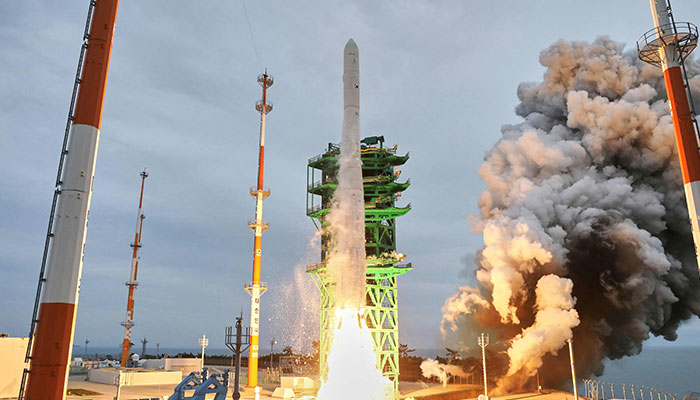South Korea successfully launches homegrown rocket after delay
Seoul also plans to land spacecraft on Moon and Mars by 2032 and 2045, respectively
SEOUL: South Korea on Thursday launched its first-ever homegrown rocket following a delay related to a technical glitch.
Nuri lifted off into the sky from the Naro Space Center in South Korea's southern coastal region at 6:24pm local time, successfully separating its eight satellites into orbit.
"We report to the public that the third launch of Nuri, which was independently developed to secure domestic space transportation capacity, has been successfully completed," said Minister of Science and Technology Lee Jong-ho.
The rocket was over 47 metres (155 feet) long and 200 tonnes in weight, costing about two trillion won ($1.5 billion).
He added that the main satellite communicated with the country's King Sejong Station in Antarctica. He further stated that this launch confirmed South Korea's "potential for launch services for various satellite operations and space exploration".
Le added that South Korea will launch three more rockets by 2027 as part of the Nuri project.
The launch of Nuri was hailed by South Korean President Yoon Suk Yeol, who believed that it will give the country a competitive edge in the global space race.
"The success of Nuri's third launch is a splendid achievement that declares South Korea has joined the G7 space powers," he said in a statement.
South Korea also plans to land the spacecraft on the Moon by 2032 and Mars by 2045.
-
Dutch seismologist hints at 'surprise’ quake in coming days
-
SpaceX cleared for NASA Crew-12 launch after Falcon 9 review
-
Is dark matter real? New theory proposes it could be gravity behaving strangely
-
Shanghai Fusion ‘Artificial Sun’ achieves groundbreaking results with plasma control record
-
Polar vortex ‘exceptional’ disruption: Rare shift signals extreme February winter
-
Netherlands repatriates 3500-year-old Egyptian sculpture looted during Arab Spring
-
Archaeologists recreate 3,500-year-old Egyptian perfumes for modern museums
-
Smartphones in orbit? NASA’s Crew-12 and Artemis II missions to use latest mobile tech












